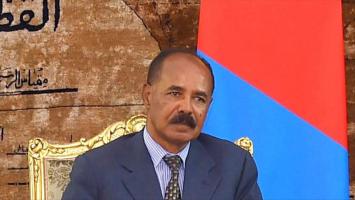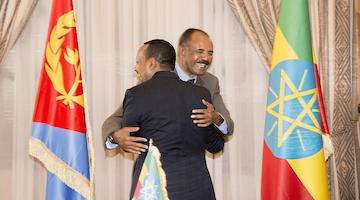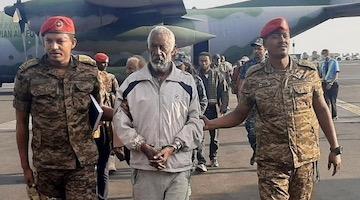Ethiopian American activist and community organizer Benyam Kitaw tells Ann Garrison that US hostility toward Ethiopia could lead to further sanctions, economic pressure, and perhaps even war.
“The primary issue is Ethiopian sovereignty vs. US/NATO military hegemony.”
Ethiopia is a nation of more than 112 million people, the second most populous in Africa, at the center of the geostrategically critical Horn of Africa. It has fallen out of favor with the U S foreign policy establishment since the 2018 uprising that overthrew the Tigray People’s Liberation Front (TPLF) junta and put Prime Minister Abiy Ahmed in power. In 2019, Prime Minister Abiy won the Nobel Peace Prize for negotiating peace to end the longtime border conflict with Eritrea.
I spoke to Los Angeles based Ethiopian American activist Benyam Kitaw about increasing US hostility to the Abiy government and to Eritrea, Ethiopia’s neighbor, former foe, and now ally.
Like other Ethiopians and Eritreans I have spoken to, he seems convinced that the U.S. foreign policy establishment’s primary issue is not so much control of Ethiopia’s markets and natural resources, but Ethiopian sovereignty vs. US/NATO military hegemony.
Ethiopia recently raised $850 million by holding an open auction for a national telecommunications contract and it was awarded to a primarily Western consortium including the UK’s Vodafone, Kenya’s Safaricom, the British finance development agency CDC, and Japan’s Sumitomo. However, China is investing and loaning heavily in Ethiopia, and its investments include a $1.2 billion investment in the transmission lines of the $5 billion Grand Ethiopian Renaissance Dam (GERD). Much of the dam, however, was financed by bonds purchased by Ethiopians, particularly Ethiopians in diaspora.
Ann Garrison: What's the significance of the peace that Prime Minister Abiy Ahmed negotiated to end the decades-long border conflict with Eritrea. And why has it been so upsetting to the US foreign policy establishment?
Benyam Kitaw: Well, Isaias Afwerki is the President of Eritrea. And one good thing that he's done for Eritrea is to make it so that outside countries, namely the United States, the UK, and the EU block have virtually no influence.
So peace is good, right? Like if the United States was at war with Canada or Mexico, that would make it very difficult for the country to progress. So peace between Ethiopia and Eritrea—and Somalia—is always a good thing.
I think really the issue for the United States, the UK, and the rest of the NATO countries is that they didn't really have a hand in it, it wasn't something that they controlled. And they don't like that. It means that the United States government can’t control what the peace entails. One being AFRICOM, the US Africa Command. Eritrea has refused to participate in AFRICOM or allow Western powers to put boots on the ground in Eritrea. The AFRICOM command base is in the Horn of Africa, in Djibouti, and pretty much any Western power can operate out of that base, but not in Eritrea, which neighbors both Ethiopia and Djibouti and has a geostrategically important port, Massawa, on the Red Sea. That upsets some of the previous colonial powers, as well as the United States.
But Ethiopia needs peace. It’s been a long time since Ethiopia has had peace, probably not since the so-called Workers’ Party headed by Mengistu Haile Mariam seized power in 1977.
AG: Eritrea is the only African nation that refuses to collaborate with AFRICOM, right?
BK: Yes, so far as I know.
AG: And Ethiopia has been a partner of AFRICOM and a troop contributor to AMISOM, the UN Peacekeeping Mission in Somalia, which has been under US command. Do you think that will continue?
BK: I'm not sure. And I think the United States government is probably nervous about that. But whether Prime Minister Abiy Ahmed is in power or not, what the common Ethiopian wants is sovereignty, so that Ethiopia can pursue peace and other goals as a sovereign nation.
I think the TPLF was allowed to rule with the blessing of the Western powers for so long because it subjected itself to US foreign policy.
So we don't know whether Abiy, if he stays in power, or the next prime minister, whoever that may be, will allow the United States to keep military boots on the ground in Ethiopia. I don't know.
It would be nice if there were some kind of peaceful agreement, but I think what's most important, first, is the sovereignty of the African countries involved—Ethiopia, Eritrea and Somalia—and the peaceful agreements between them.
AG: You’ve named three powers involved, Ethiopia, Eritrea, and Somalia. Aren't there two other countries in the Horn, Djibouti and Kenya?
BK: Yes, Kenya. Kenya has historically been a friend to Ethiopia. The only time that I've seen any type of potentially hostile behavior between Kenya and Ethiopia happened recently, when Kenya signed a military agreement with Egypt, which is of course hostile to Ethiopia over the Grand Ethiopian Renaissance Dam on the Nile River. But Kenya has been peaceful. Djibouti has been peaceful. There hasn't been a lot of recent conflict in comparison to the other three countries, especially Somalia and Ethiopia.
And so this agreement between Ethiopia, Eritrea, and Somalia is a good thing, whether you like their current leaders or not. They're trying to figure out how to have some kind of collective agreement to peace and to shared economies. It's a very good thing.
AG: It most likely upsets the US foreign policy establishment to see three African nations in the Horn coming together to chart an independent path.
BK: I fully agree with that. And I think the behavior of US Secretary of State Anthony Blinken and probably this guy, Jeffrey Feltman, the new US Special Envoy to the Horn of Africa, confirms that. They're kind of like the voices of an old voice on US foreign policy, namely Susan Rice. She’s not even supposed to be involved in foreign policy now—she’s supposed to be Biden’s domestic policy advisor—but it seems like everything she believes is leaking back into current US foreign policy.
What I mean by that, for example, is that during the Meles regime, and then after him, all kinds of ethnic atrocities were committed. Actually, one of the people involved was Tedros Adhanom Ghebreyesus, the current Director-General of the World Health Organization. If Secretary Blinken and Special Envoy Jeffrey Feltman were so concerned about atrocities and ethnic cleansing, then they should be talking about how this was the historical record of the TPLF regime headed by Meles Zenawi, but they're not. They're focusing on what's happening in Tigray because they want their puppet government back. They want a government that they can control. They're not really concerned about the innocent people.
Now what's scary about that is this seems to be a pattern everywhere. The US talks about helping with democracy. Usually it ends up being a complete mess. I mean, we have a couple of really good examples in Syria and Iraq.
AG: President Trump cut a hundred million dollars in aid to Ethiopia and warned that Egypt, a key US ally, might blow up the Grand Renaissance Dam, which is Ethiopia's project. And then the US Congress recently censured the Ethiopian government over alleged atrocities in Tigray and imposed sanctions. How much is this hurting Ethiopia?
BK: Well, the sanctions themselves, at the moment, aren't going to significantly hurt the common Ethiopian people. The current sanctions target members of the Ethiopian government. The sanctions could be ratcheted up to hurt the whole population—that’s the usual pattern—but right now the cuts in aid are more of a problem.
And the Grand Ethiopian Renaissance Dam is another linchpin of US foreign policy. It could take 5 to 15 years to fill the dam, depending on rainfall, but if the GERD is completed, that means Ethiopia will have greater access to electricity. It has the potential to provide electricity to roughly 100 million people, many of them peasant farmers. And that means that Ethiopia will become more economically self-sufficient and become a serious economic competitor to Egypt. And that's what Egypt is really angry about. They don't want another economic power in the region, and it appears that the US is trying to help Egypt keep Ethiopia weak and aid dependent, instead of allowing it to become economically self-sufficient.
AG: I looked this up: Egypt seems to be Africa’s third largest economy after Nigeria and South Africa. Nigeria’s GDP is US$448 billion; South Africa US$351 billion/year, and Egypt US$300 billion/year.
Ethiopia already has one of the larger economies in Africa with a GDP of $95 billion/year, roughly the same as Kenya’s, but that’s only about one third the size of Egypt’s.
BK: Yeah, but Egypt doesn’t want that to change, and the US wants to keep Egypt happy.
AG: Hostilities to both Ethiopia and Eritrea have been undeniably similar to those preceding the US NATO wars in Libya and Syria. And some people have told me that Ethiopians in Eritrea are preparing for the possibility of direct US military aggression or aggression by a US regional proxy, most likely Egypt or a multinational force led by Egypt. Do you think those preparations are warranted?
BK: Warranted by the Ethiopian and Eritrean people? Absolutely. My guess is that the US is going to keep tightening the noose with sanctions and economically.
They've already granted Egypt more military aid. I think that was just about a month ago. And it would be easier for the US foreign policy establishment to use some kind of Egypt-led force to impose what it wants than to put US boots on the ground. But in any case, it seems very clear that the US just doesn't want the Ethiopian or Eritrean people, or any of the peoples in the Horn, to have true sovereignty. Besides and beneath the turmoil about the GERD, sovereignty is the main point of contention.
And I don't understand why. It would actually be much easier for the US government to try to work with the existing powers in the Horn instead of trying to undermine or overthrow them. Because what Ethiopia will do is move closer to Russia and China. Ethiopia has been developing deeper relationships with China, and there've been diplomatic relations between Russia and Ethiopia for about 140 years. And Russia and China are going to continue to be big powers, and that’ll just push Ethiopia closer to them instead of the US and other Western powers.
AG: If the US is aggressive, the aggression will push Ethiopia and its allies in the Horn closer to Russia and China?
BK: Absolutely. And Ethiopia is not a pushover. Ethiopia may not be militarily as strong as the UK or the United States, but it has a very well-established history of defending its sovereignty very effectively. So if the United States invades in some form or fashion, whether it's through Egypt or through a NATO force or whatever, it's not going to go the way they think it's going to go. It's going to be messy and ugly. And the Ethiopians are going to dig in because the Ethiopians enjoy a proud history of sovereignty and independence.
I wish the US and the rest of the Western block would just accept Ethiopian, Eritrean, and Somali sovereignty, even if it's just temporarily until the next guy's in power. There could be temporary solutions. But those countries are not going to take military aggression lightly. And the historical pattern is that it doesn't go in favor of the invading power.
AG: Well, this new US Special Envoy to the Horn, Jeffrey Feltman, said that Ethiopia would make Syria look like a picnic.
BK: Yeah, he’s right, and I think he's a smart guy, but he’s just not going to get what he's trying to push for. It seems as though he specifically, maybe more than anyone else, really wants the TPLF’s US puppet regime back in power. And that's just not happening. The Ethiopian people will not allow that.
Benyam Kitaw is a Los Angeles-based, Ethiopian American activist and community organizer. He can be reached on Twitter @Benyam_Kitaw.
Ann Garrison is an independent journalist based in the San Francisco Bay Area. In 2014, she received the Victoire Ingabire Umuhoza Democracy and Peace Prize for promoting peace through her reporting on conflict in the African Great Lakes Region. Please help support her work on Patreon. She can be reached on Twitter @AnnGarrison and at ann(at)anngarrison(dot)com.
COMMENTS?
Please join the conversation on Black Agenda Report's Facebook page at http://facebook.com/blackagendareport
Or, you can comment by emailing us at comments@blackagendareport.com



















